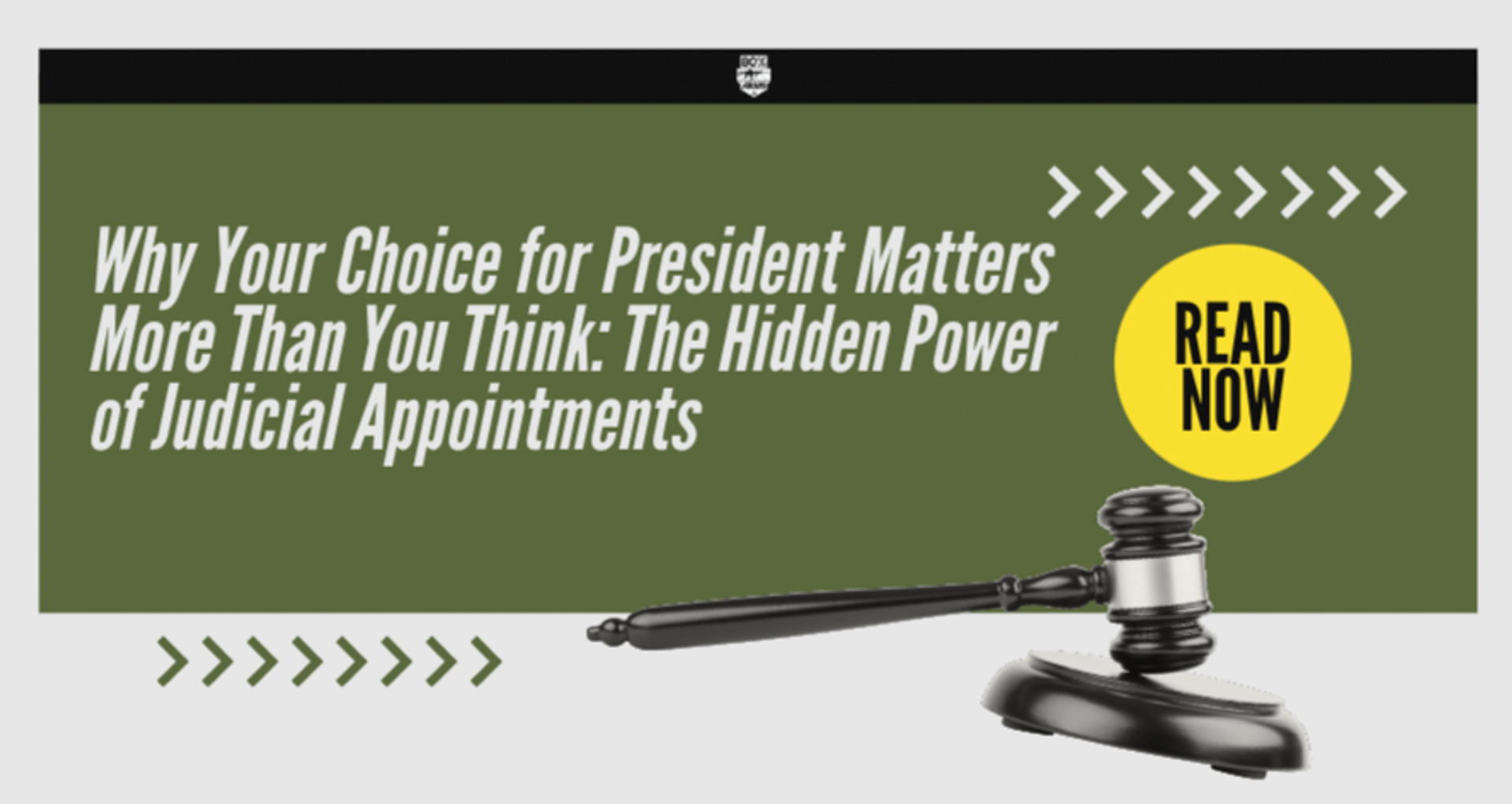Why Your Choice for President Matters More Than You Think: The Hidden Power of Judicial Appointments
When you think about a president’s impact, the decisions that really stick around often come from their judicial appointments, especially when it comes to Second Amendment protections. Unlike policies that can be undone or changed, federal judges shape laws for decades, and nowhere is this clearer than in cases involving gun rights.
Take the Trump era, for instance: his influence is still being felt in key cases around 80% lowers, bump stocks, and forced reset triggers. Trump’s picks for the federal courts have been crucial in reinforcing or reinterpreting the Second Amendment, and that impact is likely to last long after he left office.
The Long Shadow of Judicial Picks
Federal judges have lifetime appointments, meaning their decisions affect our laws for generations. While presidents can push for quick policy changes with executive orders, it’s the courts that get the final word on how those policies align with the Constitution. That’s why picking judges is one of the most enduring ways a president can shape the country—especially on hot-button issues like gun rights.
By the time Trump finished his term, he had placed over 200 judges on the bench, including three on the Supreme Court. These judges have played a critical role in decisions about firearms, sticking to a strict interpretation of the law that prioritizes individual rights over government power. Cases involving bump stocks, 80% lower receivers, and pistol braces are examples of how Trump-appointed judges have limited government overreach on gun regulations.
Key Rulings on Gun Rights
- Cargill v. Garland: The Supreme Court struck down the ATF’s bump stock ban, a rule Trump himself initiated. Justices like Neil Gorsuch, Brett Kavanaugh, and Amy Coney Barrett emphasized that Congress, not regulatory agencies, has the power to change laws like the National Firearms Act. This decision reinforced that legislative intent matters and put a check on agency power.
- NAGR v. Garland: A district judge, appointed by Trump, ruled that forced reset triggers don’t qualify as machine guns under current laws. The case built on the same idea: that regulatory agencies can’t just expand their authority without Congress.
- Morgan v. Garland: Another judge appointed by Trump questioned the historical basis for bans on certain firearms, using the Supreme Court’s Bruen decision as a guide. The ruling suggests modern gun regulations have to align with the original intent of the Second Amendment, inviting more challenges to restrictive laws.
- Vanderstock v. Garland: This case is a big one for firearm enthusiasts. It involves 80% lowers, and judges have questioned whether the ATF can regulate unfinished receivers without explicit approval from Congress. Here, too, Trump-appointed judges are playing a huge role in limiting regulatory reach.
The Bruen Decision and Its Ripple Effect
The Supreme Court’s Bruen ruling laid down a new standard: gun regulations must have historical support to be constitutional. This has empowered judges, many appointed by Trump, to strike down laws that don’t meet this test. It’s a major win for gun rights advocates, who argue that the Second Amendment must be interpreted as originally written.
Why Advocacy Groups Need Sympathetic Judges
Groups like the Firearms Policy Coalition and Gun Owners of America rely on courts to uphold Second Amendment rights. While they can challenge laws in court, their success often depends on whether judges are sympathetic to their cause. With the judiciary leaning more conservative, thanks to Trump, these groups have a better shot at preserving gun rights.
What a Kamala Harris Presidency Could Mean
If Kamala Harris becomes president, her approach to gun control would likely be stricter. She’s pushed for more regulations, like banning assault weapons and high-capacity magazines. With the power to nominate judges, she could shift the courts to favor gun control. This possibility underscores why judicial appointments are crucial; they shape the legal landscape long after a president’s term.
The Takeaway
Judicial appointments are about more than just politics; they’re about the lasting protection or restriction of rights. Trump’s judges have taken a firm stand on the Second Amendment, limiting federal agencies' regulatory reach and setting strong precedents. Even if future administrations try to implement stricter gun control measures, these judicial philosophies could act as a safeguard for years to come. The courts truly are the guardians of our constitutional rights, making judicial appointments one of the most enduring legacies of any presidency.



 Back to List
Back to List